
Diana Thorneycroft
“In all ages there have been some excellent workmen, and some excellent work done. The question he (the critic) asks is always:—In whom did the stir, the genius, the sentiment of the period find itself? where was the receptacle of its refinement, its elevation, its taste?”
Walter Pater (Renaissance; Studies in Art and Poetry)
“The tendency for dark personalities to exhibit relatively higher levels of nonverbal IQ is intriguing but the implications are unclear. The finding defies the stereotype of the smooth talking manipulator but supports the notion of a complex intellectual deficit. One possibility is that the frustration arising from an inability to communicate ones ideas eventuates in more malevolent interpersonal strategies.”
Palthus and Williams (The Dark Triad of Personality: Narcissism, Machiavellianism, and Psychopathy. Journal of Research in Personality, December 2002)
“Those whom the gods destroy, they first make mad.”
Euripides
“Bertha, playing her role (her second ‘personality’) on the stage of hysteria, was also watching from the wings, as spectator of her own theatricality. The paradox of the trace (of hysteria) is nothing other than the ‘paradox of acting’, as Diderot put it, which is why Bertha concluded that ‘the whole business has been simulated’.”
Mikel Borsch-Jacobson (Remembering Anna O)
“…there is no quest without pain; there is no lover who is not also a martyr.”
Henry Suso (1300s, quoted by Evelyn Underhill, Mysticism: A Study in the Nature and Development of Man’s Spiritual Consciousness, 1912)
“The machinery for dreaming planted in the human brain was not planted for nothing. That faculty, in alliance with the mystery of darkness, is the one great tube through which man communicates with the shadowy.”
Thomas DeQuincey (Suspiria)
There has been a removal of criteria in cultural life, today. And the removal has been gradual, over many decades. And during that time it seems to have operated under cover of anti hierarchical ideology, or value system. In other words, the removal of criteria is implemented by pretending to be a corrective to rigid hierarchies established by ruling class taste. But the ruling class has not been effectively influenced by any of this. Instead the post modern (if that’s what were talking about and I’m not sure we are) tendency has been to remove ideas of enthusiasm for culture for altogether. The loss of language skills has, as one of its social effects, led to greater frustration and sociopathies across the entire class spectrum. An inability to communicate ideas and feelings, as well as a validation for not having real opinions on the value of cultural objects, means that almost by extension the psychopathic or at least maladaptive personality is granted the social space to be inarticulate and aggressive. As long, that is, as the aggression if channeled into approved areas of expression. The role of irony and snark looms in all of this.

Oli Kellet, photography.
“But the voice is also the voice of the infant’s suffering and need. When the cry does not bring instant relief, it becomes itself the symbol of unsatisfied desire, even the agency of the frustration of this desire. It is almost as if there arose a ‘bad voice’, in parallel to Klein’s ‘bad breast’. But the crying voice is not the breast and cannot provide what the breast can provide. Instead of filling the baby up, it empties it, adding to the need for food an unpleasant and frightening constriction of breath. “
Steven Connor (Violence, ventriloquism and the vocalic body; Psychoanalysis and Performance, ed. Michael Bell)
The short essay The Dark Triad (Palthus and Williams, 2002) gave birth to a follow up that included the triad plus cruelty to animals. And this struck me because in some strange way humans seem even more insensitive to animal suffering, and not less, as species die out daily. But this is the same logic that indicated anti-semitism increased in the U.S. after WW2. There was a recent Navy exercise in Australia that slaughtered hundreds of whales and dolphins. This had been predicted and even bragged about by defense contractors Raytheon. The U.S. is developing the same electromagnetic devices and will soon be testing them. This casual indifference to our fellow creatures seems very much in line with the sociopathy of contemporary life. The underclass are little different than those factory farmed cattle and pigs.
Let me leave that thought for a moment and segue to the metaphor and materiality of ventriloquism. The displaced quality of the voice has always been something theatre artists were aware of, even the most pedestrian of them. One cannot recite text aloud and not recognize the strange ventriloquism of the actor on stage.

Graciela Iturbide, photography.
“And yet there is a loss, of a kind; I mean, the loss of the loss of the voice. We have been severed, not from our voices, but from the pain of that severance. What aches most is the numbness; what is strange is the familiarity of the disembodied voice.”
Steven Connor (Violence, ventriloquism and the vocalic body; Psychoanalysis and Performance, ed. Michael Bell)
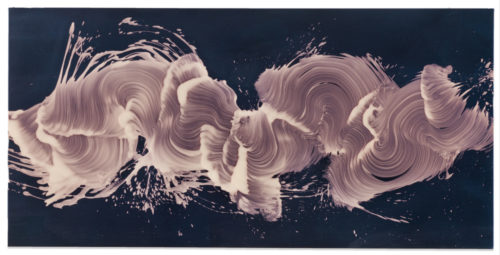
James Nares
Connor’s observation above is insightful. The severed voice and its always uncanny aspect has been buried beneath a normalizing insistence from the society of technological supremacy. We are told not to dwell on our experience of this uncanny and often melancholy feeling.
“The psychoanalyst Otto Fenichel thought that the stammerer was in the grip of an anal-sadistic impulse to utter obscenities: ‘It is well known that for stutterers words may have the significance of faeces’, he airily began one article on the subject. Because speaking means ‘utterance of obscene, especially anal, words; and secondly, an aggressive act, ultimately to kill’, the stutter is both the repression of this impulse and the autoerotic pleasure gained from holding back words ‘as faeces were held back in infancy’, such that ‘one may indeed speak of a displacement upward of the functions of the anal sphincter in stuttering.’ Stammering has been seen as the unsuccessful account to manage oral anxieties relating to nursing. It has also been seen as the result of a struggle between the stammerer’s huge investment in the magical power of words and the countermanding need to repress his own desire for verbal power. Stammering is therefore to be understood as the enactment of castration anxiety: ‘to speak, or to speak well, means to be potent; to be unable to speak – to be castrated.”
Steven Connor (Beyond Words)

Bruno Gironcoli
Stuttering or stammering has been associated with limping, both materially, but more especially symbolically. Freud even saw certain kinds of limps as reflective of the life instinct in its two steps forward and one back lack of directness. But titurbation (as Connor notes) was synonymous with stammering. But stuttering seems more closely aligned with Death and mordibity….not life. And I think the linkage of stammering with the imagery of Satan and evil is more logical. Johann Dieffenbach, an early 19th century Physician in Germany wrote of his surgical experiments to cure stammering. Among which was a partial splitting of the tongue. As Connor notes, there is a religious excess at work here, a kind of religious intoxication. Curing, purifying the speech. For speaking is always a doubling, and always a ventriloquist act. And all ventriloquist acts are uncanny (obviously) but also slightly subversive and unnatural. Unwholesome. Its not just the demonic quality of the wooden face (which as Von Kleist noted is much closer to God than not) but also the manipulation of voice and sound and speech. And ventriloquists tend toward a slightly unsavoury quality. Traveling salesmen of the entertainment spectrum.
And this alien quality, this near immorality is together with the very otherness of the voice. This is part of what makes actors speaking memorized texts, while on stage, somehow very much more ‘other’ than when its done in film. The inherent otherness of our voice is being fetishized on stage. The ceremony of the foreigner within us: that which speaks. That the inquisition needed confessions to be spoken aloud and today the speech act is being forgotten in one sense. The recorded message has all but replaced conversation of a ritual kind. Even if just bureaucratic ritual. The loss of the loss of voice; this is also the phantom limb still having feelings. Our lost voice still speaks, and we still hear it. But ONLY we hear it. The end of Blow-Up, where one hears the ball only there is no ball.
The voice of the inquisitor is like the voice of any institutional judge or magistrate. Torquemada in the Spanish Inquisition was there as a bill collector, essentially. The medieval inquisition of two hundred years earlier was interestingly one in which defenses were mounted and on occasion (rare but still) suspects were acquitted. But the point is the alienated voice. The speech of the institution is a voice without quality.

Liam Wong, photography.
People are always shocked the first time they hear their recorded voice. It is literally never the voice you have imagined and heard in your own head. One is never self aware about our voice. And even those who perform on film or video rarely develop much awareness beyond very technical skills. There is a fascinating chapter in Connor’s book Beyond Words on the history of certain letters in English. The letter *h* for example. It is an anomaly as far as consonants go.
“But the sound supposed to be signalled by the aspirate letter h is a kind of pure debouchure, orally unobstructed and minimally modified by the mouth. It approaches, we might say, the degree zero of consonance. It is a consonant in the sense that it is lacking in voice, but vowel-like in that it appears open and unconstrained. Indeed, it has sometimes been described as an ‘aspirated vowel’.”
Steven Connor (Beyond Words)
And this could lead to a very long discussion and one I’d like to write about more, regarding the way ancient Hebrew is written, and in comparison ancient Greek. The Hebraic elimination of written vowels. But for the purposes here, Western society has learned familiarity with visualization. Optic discoveries coincided with psychoanalysis, as I’ve written before, and with a world of the UNseen. Germs and repressed wishes. Seeing is believing etc. But the capacity to listen, to hear, has atrophied. And perhaps it began to atrophy once speech became subservient to text.

Pope Innocent III (detail) by the Master of Pope Innocent’s III Bull. Lower Church of Sacro Speco Monastery, Italy, 13th century.
“Among living beings, only man has language. The voice is the sign of pain and pleasure, and this is why it belongs to other living beings (since their nature has developed to the point of having the sensations of pain and pleasure and of signifying the two). But language is for manifesting the fitting and the unfitting and the just and the unjust. “
Aristotle (Politics)
It is not just that listening has atrophied, but that listening and processing that listening has also deterioriated. But its not exactly that; its an erosion of *hearing* this as distinct from that. I think people listen, or rather hear, today, in larger flat fields of sound. They almost certainly do compared to a mere fifty years ago. What one heard four hundred years ago was very different. People in Shakespeare’s London would say, ‘lets go hear a play’.

Zao Wou Ki
“The human body, like language, is that which is continually to be caught in the process of surpassing itself, whose interiority is ceaselessly extrinsic to it, whose inside is always already on the point of becoming an outside. For the human subject to be embodied is for it to be constantly non-self-identical—which is to say that the root cause of our non-self-identity lies in what we do, not in some ambiguous text or enigmatic discourse which could then be contrasted with the stolid, suspect certainties of action.”
Terry Eagleton (Self Undoing Objects, from Rewriting the Self, ed. Roy Porter)
This is where the metaphor of ventriloquism finds importance. On a social/political scale the subject …the bourgeois subject, is now the only point of discussion. It is the starting and ending of discourse. And yet however one wants to approach subjectivity, there is an aspect of acute alienation at the heart of it. Everyone senses this, feels it, but mostly — because of having to get through the day with jobs and authority restrictions and desire — one spends very little time reflecting on it. For all the therapeutic models and programs out there, the idea of contemplation seems increasingly remote.
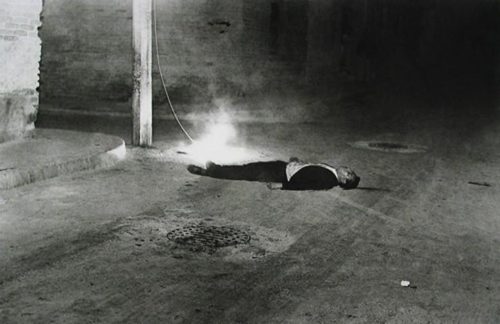
Enrique Mentinides, photography.
Part of this has to do with the political reality of advanced capitalism. Or consumerism.
“In the classical phase of capitalism, there was a place— call it culture, consciousness, religion, the family, the aesthetic—where we were still just about free, even if encircled on all sides by powers which laid siege to our liberty. What has happened in consumerist, so-called postmodern capitalism is that these erstwhile auratic enclaves have themselves been steadily integrated into general commodity production, as art, culture, sexuality, and (in the US at least) religion become themselves forces in material production.”
Terry Eagleton (ibid)
Subjectivity without a subject. We are this massive impersonal collection of repressions. But one must, as Eagleton notes, make something out of that which makes us. But so paralysing is the current social reality, the objectified *subject* is never really able to think itself in relation to the social. The doubling of our experience of speech is part of this. Perhaps this is also why I still find theatre the most significant of art forms. For only on stage is this ventriloquist act sanctioned. Only there is it the point of speaking aloud. Which am I? Ventriloquist or Dummy?

Wanda Koop
Whenever I read about contemporary artists, whether in interviews or in gallery copy, or art magazines, whenever I hear that the artist in question is *asking questions about gender…or the female gaze or male gaze or about whatever….fill in one of a thousand various po mo cliches….as soon as one reads or hears that, one knows this is going to be bad art. That is just not what art does. It does not *question* societies definitions of anything. Criticism does that. Not the artwork. Artists on a certain level, and perhaps the primary level, cannot know what they are doing. They can only know if they are doing it and its not working. That much one can know. Im doing it wrong. Beyond that, its all a great puzzle. But the post modernist cultural rhetoric is simply reflecting the post modern erasure of man. Whether you attribute this to Foucault or Derrida or Whoever, this idea of the demise of man or the individual (hence the ascension of the term *subject*) was always an issue with serious thinkers. Even religious ones (see John Donne, Meister Eckhart, St Anselm, Nicholas of Cusa, et al) seemed to question the construction of the individual per se.
Like the old Taoist saying, ‘before enlightenment I would look at a mountain and it was only a mountain. After I studied and meditated the mountain became something much more. When I reached enlightenment, the mountain was only a mountain again’. So there is history and memory, and there is amnesia and revisionism.
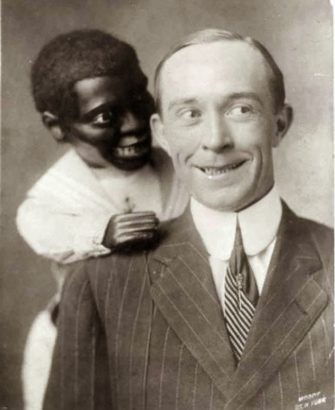
Ventriloquist and his Dummy. Date unknown.
“As in the United States, it was outside the academy that psychology would find its growth points in Britain. Psychologists together with doctors and philanthropists played a key role in the eugenic movement, with its concern for the identification of ‘feeble-minded’ schoolchildren which led to the development of the intelligence test: Charles Spearman’s famous paper ‘“General intelligence” objectively determined and measured’ was published in 1904; the Chief Medical Officer of the Board of Education recommended the use of ‘psychological and educational tests’ for differentiating the normal from the feeble-minded child in his report of 1911; Cyril Burt was appointed as psychologist to the London County Council in 1913 and William McDougall published his article ‘Psychology in the service of eugenics’ in 1914 (for details of all these examples, see Rose, 1985). Burt and other psychologists were important figures in the vociferous mental hygiene movement of the 1920s and 1930s, were involved in setting up the Tavistock Clinic in 1920, the Child Guidance Council in 1927, and the first mental health course for psychiatric social workers which started at the London School of Economics in 1929.”
Nikolas Rose (Assembling the Modern Self, Rewriting the Self, Roy Porter, ed.)
The institutionalization (MFAization) of culture has meant that individualism in the form of uniqueness and innovation has been prioritized. Lifestyle remains a word people actually use and think means something.

Andrea Wolfensberger
“…not all voices are heard, and perhaps the most intrusive and compelling are the unheard voices, and the most deafening thing can be silence. In isolation, in solitude, in complete loneliness, away from the madding crowd, we are not simply free of the voice—it can be that this is when another kind of voice appears, more intrusive and compelling than the usual mumbo-jumbo: the internal voice, a voice which cannot be silenced. As if the voice were the very epitome of a society that we carry with us and cannot get away from.”
Mladen Dolar (A Voice and Nothing More)
The assault of noise coincides with this further distancing from the voice. And the hyper individuation is resulting in a general failure in simple conversation. The substitution is a kind off frenetic talk — and often this take is entirely ironic. But this touches on something else, the shift in the performance of self, for lack of a better description. Alan Reid has an essay on the legacy of mysticism and hypnotism in psychoanalysis. And the question of the analysand *feigning * symptoms, the learned performative gestures and sounds of the lunatic (sic).
“…the reproduction of the hypnotic scene or the location is replaced by acts of memory and remembering. Here the performance of the talking cure moves beyond reproduction to a paratheatrical state where the surreality of simulation through multiple ‘fictions’ is, as Hélène Cixous says in her reading of the uncanny, ‘neither real nor fictitious, “fiction” is a secretion of death, an anticipation of non-representation, a doll, a hybrid body composed of language and silence that, in the movement which turns it and which it turns, invents doubles, and death.’ This consulting room which is neither ‘real’ nor ‘fictitious’ evokes the deadly double of the uncanny. The performative allusions of Sophie Calle serve to remind us of the haunting theatrical illusions in the place of psychoanalysis.”
Alan Reid (The Placebo of Performance)
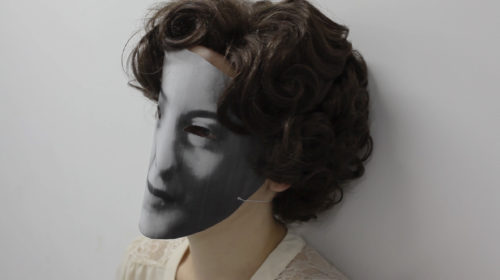
Sarah Anne Johnson, video still.
The consulting room, the ritual space that is neither real or fictitious. The uncanny is, then, something Freud cultivated in a sense. And he was certainly conscious of this.
“The prime factor is unquestionably the process of getting rid of one’s emotions by “blowing off steam”’. Character and ‘acting’ are presumed to be central to the performer– audience relationship in which ‘someone other than himself . . . is acting and suffering on the stage”.
Freud (Psychopathic Characters on Stage)
“…the history of the psy disciplines is much more than a history of a particular and often somewhat dubious group of sciences it is part of the history of the ways in which human beings have regulated others and have regulated themselves in the light of certain games of truth. But, on the other hand, this regulatory role of psy is linked, I suggest, to questions of the organization and reorganization of political power that have been quite central to shaping our contemporary experience. The history of psy that is to say, is intrinsically linked to the history of government.”
Nikolas Rose (Inventing Ourselves)
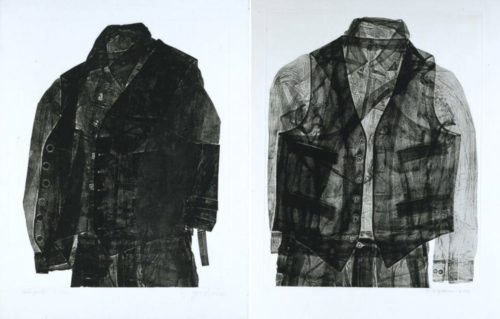
Betty Goodwin
The short version of Rose’s thesis has to do with government’s subsumption of psychological disciplines to regulate the populace. And that the regulating itself took the form of classification and (as Rose puts it…) “techniques for the disciplining of human difference: individualizing humans through classifying them, calibrating their capacities and conducts, inscribing and recording their attributes and deficiencies…” This was both efficiency as a model, and inefficiency as a model. Resulting in something that is, in fact, rather uncanny. And this sort of returns me to the ventriloquist again.
Ventriloquism is the manifestation of the inherent uncanniness of our speech. The mass bureaucratization and administration of society manufactures, as a byproduct, a mass sense of the uncanny. It is worth noting as Frank Tallis does (and his book, Hidden Minds is very fine, indeed) that there are three great novels of doubling, or split personalities. All roughly from the same era ; James Hogg’s The Private Memoirs and Confessions of a justified Sinner, Robert Louis Stevenson’s Dr Jekyll and Mr Hyde, and Dostoyevsky’s The Double. That they happen to be three of my favorite novels might say more about me than anything else. But I digress. The fascination with what we now, post Freud, call the unconscious was growing in significant degrees. All of these novels are oddly prophetic, too. And all are works of pessimism I think. They were still in a Romantic tradition, but were pointing toward something else. Something ominous. Not rationality, certainly, but something more elusive.

Jae Yong Rhee, photography.
“Many years after conducting the first perceptual defence studies Jerome Bruner colourfully suggested the conscious mind must be equipped with something like a ‘Judas eye’ – the peephole used by bouncers at speakeasies to distinguish between members (for whom the door would open) and the police (to whom the door would remain closed).
But in a perceptual defence task, who is looking through the Judas eye? Who is opening the door – or at least leaning on it in an attempt to keep it closed?”
Frank Tallis (Hidden Minds).
Ventriloquist or dummy? Of course we are both.
“[The] scientific view is one that gradually reveals how and why we come to believe in an illusion. The illusion is that there is somebody in there; that consciousness does things; that we as independent, separately existing conscious entities run our lives and move our arms and legs. ”
Susan Blackmore (Journal of the Society for Psychical Research)
The manufacturing of the uncanny is part of the society of the spectacle, to quote Debord. And the hyper individualism of this system is there to deny and discourage community. And organizing. So in a sense the emphasis on the individual is a way to distract from the fact that the self is at least partly, if not largely, ephemeral.
“Until the very end, however, Foucault continued to investigate the “processes of subjectivization” that, in the passage from the ancient to the modern world, bring the individual to objectify his own self, constituting himself as a subject and, at the same time, binding himself to a power of external control.”
Georgio Agamben (Homo Sacer)
Agamben notes that the reduction of life to something like a facsimile concentration camp (discussing Arendt) was partly what drove total domination. In other words a system of maximum inequality, maximum profit, made control necessary. Not just control but ever more draconian forms of control, much of it psychic. But the difficulty in such discussions — at least with Agamben, is that his very prose, and mostly his logic, feels infested with the very residue of individuation. Like Badiou and Virillo, perhaps, there is a reactionary aspect that is almost structural if one is speaking of rhetoric and grammar. Agamben is reactionary in the same way Hannah Arendt is reactionary.

Hans Arp
Not to say Agamben doesn’t make insightful observations, but that finally he seems indifferent to the borderline sentimentalism of his thinking. In any event, in the published letters of Carl Jung and Sigmund Freud, the first mention of Sandor Ferenczi refers to him as a Hungarian ventriloquist. If this was a joke, nobody seems aware of who made it. And if not, it suggests Ferenczi sidelined at Budapest dinner theatre with a Vent Act.
“In `Confusion of Tongues’, Ferenczi returns to Freud’s earliest ideas about the traumatic effects of childhood sexual abuse to insist that the child’s material experience of abuse and invasion could result in her identifying with, introjecting and even speaking in the voice of the attacking adult. This confusion over who speaks can be seen to result from a confusion over where tongues literally are: in whose mouths, in relation to whose bodies.”
Pamela Thurschwell (Literature,Technology, and Magical Thinking)
Thurschwell quotes John Forrester (from The Seductions of Psychoanalysis):
“However abstemious Freud aimed to be in his claims as to the ability of psychoanalysis to read the future, let alone write it, and however sceptical in an Enlightenment tradition he might have been, he was well aware that psychoanalysis owed its vitality to its epistemic neighbours ± the occult, the prophetic, the promisers of all kinds.”
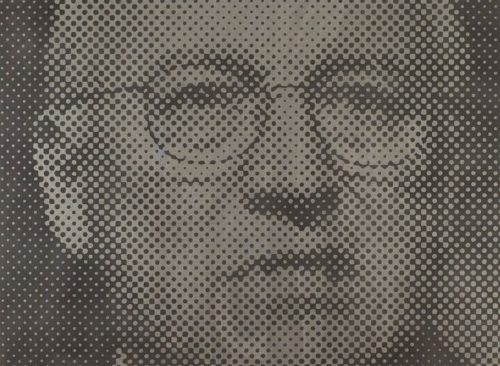
Wayne Gonzales
The point here is one that Steven Connor touched on in his book Dumbstruck (A Cultural History of Ventriloquism); and that is that the uncanny that accompanies speech, and certainly is intensified to some degree in ritual spaces and practices, but that sound overall has a complex interrelationship with space. And the Oracle at Delphi raises this issue in another way. The off-stage voice. In theatre I used to have students write exercises with off stage voices. Ones you would never see. Then with ones you would later come to see. The power of the unseen voice is primordial. On stage the character on stage must look in the direction (off stage) of the voice. One might think of Krapp’s Last Tape here, too, or Margarite Duras magnificent India Song. The Duras is so haunting (it may be the most haunting, in a pure sense of that term, of any theatre piece I know — and even the film is nearly as haunting) because the audience never knows the voices speaking. They know the voices know. But that is it. Are we to trust them? Yes, implicitly. But why exactly?
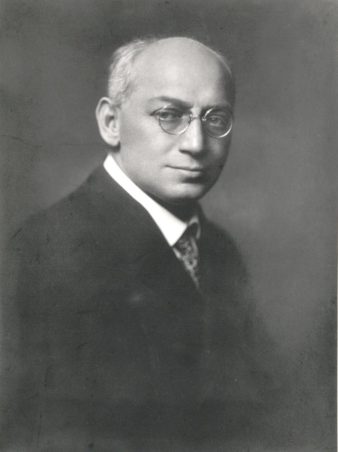
Sandor Ferenczi
Or rather, perhaps, to Origen and the Witch of Endor. Connor has a terrific chapter on this, too. For the purposes here, the invention of a priest class is anchored by God speaking to the elect. You cant hear it, only I can. The voice we cannot hear. But, we must believe is heard…by someone. The contemporary spectacle of recorded and computer generated voices is one serves to further distance that inner voice we resolutely mis-recognize.
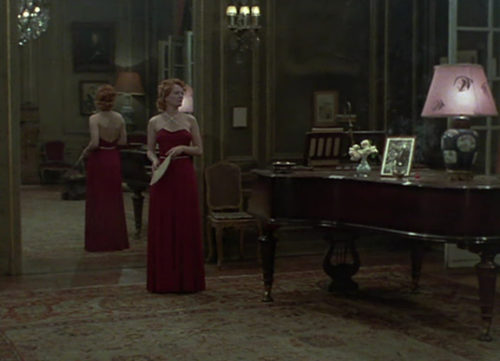
India Song (Margarite Duras, dr. 1975)
“The problematic relationship between biological and psychological `origins’ has therefore generated a hybrid narrative space in psychoanalysis. Laplanche and Pontalis have drawn attention to the peculiar `middle ground’ occupied by scenes that are supposed to transcribe the biological development of the species in the cultural development of the individual: the primal scene, the seduction scene, the castration scene and the return to the mother’s breast. Clearly it is the status of fantasy in these that renders their `reality’ problematic.”
Martin Stanton (Sandor Ferenczi)
And this is, finally, the thing that most interests me in questions of art. For I think the occult and art, and culture, share very close relations. In schizophrenics, the list of symptoms includes hearing voices and imagining hearing the inner thoughts of others. The voice is the ultimate act of being conscious. And in art, the role of silence looms very large, especially today in the era of man made noise. The ventriloquist metaphor, and its actual history as a practice, is resonant for theatre art, I think. And the Stanton quote above is relevant to this as well. The transcription of the psychic development is an action of voice. Of speech. The cultural history of the individual is never individual, nor is that what is, finally, being transcribed. I think it is more something of a collective history, and one that acts upon the individual who must narrate this in the terms of his or her own trauma. All art signals trauma. When it does not, it becomes marketing. Some visual artists are intensely silent (Marco Tirelli is one). But there are qualities of silence, just as there are of sound. There is the silence of holding your breath…waiting. There is the silence of a hermetically sealed vacuum. There is the silence of empty outer space (sic). And there is the silence which is not silent. The point is that under the conditions of advanced capitalism today there is a populace among whom are increasing numbers of third generation, or fourth, cognitively infantilized. One reason Jung has a certain relevance for me is that he is the psychoanalyst of infantilism. And I cut Jung a lot more slack than many. I think, perhaps paradoxically, that Jungian therapy may well be what I would choose if I was inclined at all toward going into therapy. The deuce you say…no, really; though I’m not entirely sure of the reasons other than I think in the society of the spectacle a certain cultic lack of repressiveness is a good thing. But I digress, again. In this populace of grown up infantile character there is also a growing and malignant tension or sets of tensions because the self narrated story of ourself can no longer get told. There are fewer voices.

Marco Tirelli
The loss of narrative I’ve written about a good deal. And it’s something that feels ever more acute. Symptoms, psychoanalytically, are *read*. They form a grammar, in a sense, of illness. Or maybe illness is the wrong word. The symptom must be *translated* into words and then read.
Allow me a longer quote here from John Forrester..(from Language and the Origins of Psychoanalysis):
“Perhaps we can now reformulate the divergence with which we opened this chapter by drawing upon the grammatical mode of analysis we have discussed. The language of the symptom could be conceived of as a set of marks that are structured by derivatives of primal sentences the core of the neurosis. The language that is spoken, when it is not itself symptomatic- when it is not the cliche, the repetition of words heard and tendentiously forgotten, when it is not complacently and fearfully rigid, in other words, when it does not retain the structure of theprimal sentence- rejoices in its ephemerality, which it is hoped will allow it some escape from the blind insistence that characterizes the transformed derivatives of the unconscious primal sentences. What is said in and by this spirit, this spirit embodied in Geistigkeit, always has the character of a movement, impelled by powerful and invisible forces: the change that ‘saying it aloud’ engenders bears witness to the inexplicable efficacy of speech in subverting a permanence that, before it is dissolved, appears to be constitutive of the subject.”
Saying it aloud. The ventriloquist’s dummy. Who is behind the words? Forrester notes that several 19th century philologists saw myth as a deformed or diseased language. The true meaning of words having been forgotten. The real narrative perhaps forgotten. Karl Abraham saw, in a rather too facile way, but still, that repression was operating in, or within, the evolution of language. This seems, at least in part, to be correct somehow. Now in the 21st century there is operating within language another kind of forgetting and another register of repression. In general people say fewer and fewer things aloud.

Francisco Toledo
Watching the bathos and sentimentality of faux grief for George HW Bush this week I could not help but be struck by both the vacuity of what was being said, but also the seeming impersonal quality of the language. Bush was a blood soaked aristocrat — he saw himself that way, as aristocracy. But in electronic media that is not said. What IS said is childish almost. What a 5th grader might say about the death of his pet parakeet. If that. The ability to transcribe something of personal development, our formation, is now lost for many. There is a kind of desperation or panic about what to feel. What should I feel about the dead 41st President?
The ventriloquist act is one that resembles divine revelation, too. Christian mystics would give voice, or channel inspiration. And usually a scribe would write it down. There is always some form of translation. The migration from oral to textual links to psychoanalytic practice. For all the differences between mystic and vaudeville, between analysand and analyst, between criminal and judge — the processes of forgetting or repressing and of remembering or of ecstatic vision, share certain performative similarities. And within each grammar a repression is taking place.
Re-narrating is foundational for mimesis. That is what the reader or audience does. Except for now. Or ever less…now. The enforcing of strict hierarchies, and hyper inequality, is also now finally afflicting the ruling class as well as the underclass. The proprietor is annulling his own pleasure out of a terror of giving some of it up. Even if he or she may well not even know what they posses. They wake one morning and find they are the garish painted wooden face of the Dummy. This was not supposed to be this way, they think. But then wonder.. was it always so? Did I just not notice?

Shumon Ahmed, photography.
“The world at once present and absent which the spectacle makes visible is the world of the commodity dominating all that is lived. The world of the commodity is thus shown for what it is, because its movement is identical to the estrangement of men among themselves and in relation to their global product.”
Guy Debord (Society of the Spectacle)
Today, the subject cannot identify what is felt . He or she may say something …in therapy or counselling, but that is another sort of performance, too. Or anti-performance. That is the voice of our robotic super ego, or it is the Ventriloquist’s dummy repeating old routines. The scene, the stage of trauma, and the language of memory is increasingly being erased. And the subject as audience to him or herself no longer is listening anyway.
To donate to this blog, you can use the paypal button on top.

There is a loft in an old strip mall behind my house. It has been converted into a sort of community club house of sorts and shared by various sound/animation artists, psychotherapists and healers. I sometimes go there for workshops with a friend of mine who is a breath facilitator and teaches and guides people through breathing techniques that allow the body to release held physical & emotional tensions and remind us how to listen to, use and trust our bodies.
Just this past week, I participated in an “om meditation” at the loft. It was kind of spontaneous. The event I was going to go to was cancelled and two women were doing this om meditation and asked if I wanted to join. Sure, why not? It was me (young woman), and two women in their 60s. The meditation started with some gentle dancing/warm up and then we lay down and chanted “om” together for about 15 minutes, and after that, we chanted “hu” for another 15 or so minutes. I am mentioning this because the simplicity of the exercise and the effects of it made me very aware of the consonant “h” that you speak of above and quote from Connor in reference to. The facilitator of this om meditation mentioned that ‘hu’ is the oldest toned prayer, so when I chanted ‘hu’ I was thinking of this notion of prayer.
“Om” for me felt open and easy to sustain; it was a resonant and expansive sound. I had never chanted ‘hu’ before, and when we started on ‘hu’, i found the sound was more difficult to produce and there was a kind of tension in my jaw that was harder to navigate and let the sound flow through. I had to be more mindful of how I was producing the sound and there was also a sense of slowing down that the “h” at the beginning seemed to produce. There really is something odd about the quality of “h”, as it is breath and then there is this split moment when it becomes voiced and then it is gone! like that. It is like a ghost that vanishes.
Another interesting thing about this meditation is the quality of knowing that occurs with sound as a practice that is voiced but not spoken. Semantics and words were not part of this level of communication and exploration. It is vulnerable work to breathe your voice into a room with two other people who you don’t know very well (one only by name). There was a ritual or set of instructions we were following but after that, it was a kind of listening to each others bodies producing sound and merging sound. It was a kind of listening without listening for meaning–and i think that is a quality of listening consumer capitalists struggle with: the unknown, the mystery that is greater than us and that might be known without meaning.
After the meditation, each of us shared a little of our experience. Both of the women expressed feeling a kind of spiritual shift when we began chanting ‘hu’–as though something larger than us had arrived in the room. This sense that they were describing was recalled to me upon reading the above quote from Steven Connor. Sound is vibration and can be felt in the body too. That there is a “history of letters” that you can read about is fascinating, but it seems there is also another kind of history of letters that you can practice simply by voicing them with awareness and listening. The poets know this intuitively.
In reference to GHW Bush’s exalted self appraisal. He was the only known rescued survivor out of a crew of five who bailed from a crippled bomber. That could haunt one for life but also give one great satisfaction. Hell, I’m special after all.